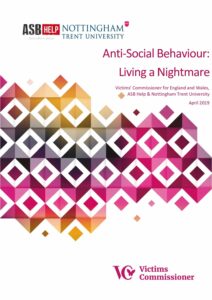Anti-social behaviour: Living a nightmare
Contact us if you need this publication in another format.
Published Report of the Victims’ Commissioner for England & Wales into Anti-Social Behaviour.
Overview
In her final report as Victims’ Commissioner (VC) for England & Wales, Baroness Newlove says that victims of anti-social behaviour are being let down by police, local councils and housing providers, with many victims having to suffer in silence.
Since her husband’s death in 2007, Baroness Newlove has tirelessly championed measures to cut anti-social behaviour. This report takes her back to the crime that placed her into the public eye, following the murder of husband Garry in an escalation of violence.
The Victims’ Commissioner said;
“A gang targeted my ordinary working family living in an ordinary street in an ordinary neighbourhood with a campaign of vandalism and violence. It culminated with Garry being kicked to death on our doorstep. It seems implausible that 12 years later, I am still writing about anti-social behaviour. But the truth is, depressingly little has changed.
“ASB is often downplayed as a petty, ‘low-level’ crime. But put yourself in their shoes – to suffer from ASB is an ordeal that causes misery, disturbs sleep, anxiety, work and relationships – leaving victims feeling unsafe and afraid in their own homes. It can feel like you are living a nightmare.
“I want this report to be a catalyst for change. I strongly believe if we crack down on ASB, empower victims by informing them of their rights and give powers to police, councils and housing providers to investigate and take rigorous action, it can reduce ASB and stop it spiralling into violence and worse.”
The Victims’ Commissioner found examples of police and council staff failing to appreciate the cumulative impact of persistent anti-social behaviour (ASB) on its victims – with each incident being treated in isolation and the underlying causes being ignored. She also found evidence of a culture of playing-down ASB as being ‘low-level’; which in turn was leading to a failure to recognise the impact it was having on its victims’ – including their mental health, their ability to hold down employment or the strain on their family relationships.
Police, local authorities and community agencies, such as social housing landlords, all have responsibility to tackle anti-social behaviour by working together to help victims. Yet the report found victims being passed from one to another, leaving them feeling as if no one is listening.
The report shows that many police forces, councils and Police and Crime Commissioners make no reference to the statutory Community Trigger mechanism used to resolve ASB (see foot note below) on their websites. Some victims found that police and council staff had never even heard of the Trigger.
The report was produced in partnership with ASB Help and Nottingham Trent University.
Jenny Herrera from ASB Help said:
‘The effects for a victim of ongoing, persistent, distressing anti-social behaviour cannot be overstated. The Community Trigger needs leadership from within central government to ensure it is fit for purpose and unlock its potential. Our extensive work has found fundamental problems, covering every aspect of the process.’”
Dr Becky Thompson, Senior Lecturer in Criminology at Nottingham Trent University’s School of Social Sciences, said:
“This report is hugely important in terms of its focus upon victims of anti-social behaviour. The findings from our research give us a better understanding of who the people experiencing anti-social behaviour are as well as the harm caused by such incidents. Ultimately, we hope the findings can be used in developing a more effective, victim-focused response to anti-social behaviour but ideally, we’d like to see our research used more proactively in trying to prevent incidents occurring in the first place.”
The report makes a number of recommendations, including:
- Recognition of the impact on victims of persistent ASB, by revising the Victims’ Code of Practice, to afford them the same entitlement to support as all other crime victims, when they reach the ‘three complaints’ threshold needed to activate the Community Trigger.
- Tackling the failure adequately to respond to 101 phone calls quickly – or in some cases, not at all and reviewing the charges and whether to mirror the free 999 emergency number.
- A legal requirement for Local Authorities, Police and Crime Commissioners, Police and housing associations to display accurate guidelines on the Community Trigger prominently on their websites and notice boards and publications, enabling all victims to seek help.
- Empowering victims of ASB by informing them about their entitlement to start the Community Trigger when responding to the second complaint within a six-month period.
- Involving victims by enabling them to attend resolution meetings to explain in person the impact the behaviour is having on them.
- Making resolution meetings a real opportunity to challenge by having meetings chaired by an independent person, thereby avoiding the impression of police and councils “marking their own homework”.
- A call for the Home Office to consider replicating legal powers available to police in Scotland who can serve warnings, fines and seize noisy equipment.
Anti-social behaviour (ASB) is typically characterised as unacceptable conduct that causes harassment, alarm or distress to an individual or their community. ASB can often be symptomatic of more serious behaviour involving crime. For example, drug gangs taking over or ‘cuckooing’ a property to sell drugs generates a great deal of anti-social behaviour and is also symptom of serious violence and drug offences.
Latest figures from the Crime Survey for England and Wales show 37% of people have personally experienced or witnessed anti-social behaviour in their community, the highest percentage recorded since this data was first collected.

